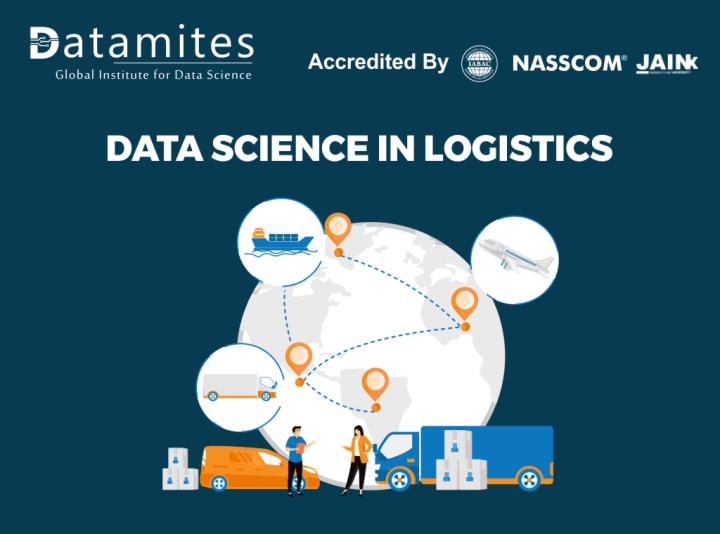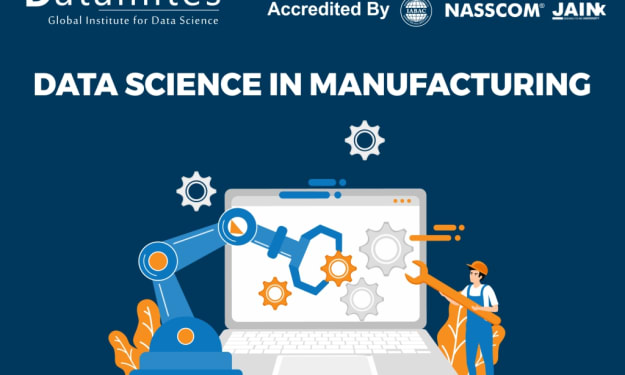Data Science in Logistics
The logistics sector, which until recently relied on antiquated manual procedures and rigid devices and machinery, lost out on efficiency, lucrative opportunities, and customer pleasure. But that is altering. Logistics is a fantastic case study for data science due to the development of digital technology, the constant change in consumer preferences, and the success of e-commerce.

The logistics sector, which until recently relied on antiquated manual procedures and rigid devices and machinery, lost out on efficiency, lucrative opportunities, and customer pleasure. But that is altering. Logistics is a fantastic case study for data science due to the development of digital technology, the constant change in consumer preferences, and the success of e-commerce. Combining analytics, pertinent statistics, artificial intelligence (AI), and machine learning (ML) to analyze trends and detect patterns would give businesses a major boost and change them.
Worldwide clients receive billions of parcels each year. Large amounts of data are gathered at each point in the supply chain, from the moment a customer places an order to the moment it is delivered in its entirety. These data include customer information, GPS information, the quantity and type of items being shipped, carrier information, delivery details, and more. The planning and execution of the interaction between people, products, and processes is at the heart of logistics.

In this we will learn how application of data science has revolutionized logistics.
How Data Science Is Used In Logistics?
The use of data science in logistics can aid businesses in improving operational efficiency. This covers everything from choosing the best delivery routes, learning how to manage fuel more effectively (and when to go), and improving supply and demand predictions.
Importance Of Data Science In Logistics
- Increasing operational efficiency: Two essential goals are ensuring operational standards and removing operational inefficiencies. Data can be used to track changes in the operational cycle. With operational data and data science expertise at hand, tracking and measuring KPIs like cost, value, services, and waste on a regular basis would aid in catastrophe prevention and remedial action. In order to take certain steps, it will improve efficiency and offer transparency.
- Route optimization: The process of finding the quickest path to a destination is known as route optimization. It aids in avoiding problems like the vehicle routing problem (VRP), which is concerned with the best path for a vehicle to take when delivering the goods to the consumer. The route-optimization algorithm takes into account information such as the quantity of the ordered products, the distance from the pickup and delivery locations, the frequency of the order, etc. Information may be swiftly communicated and used to locate the nearest vehicle using data science.. Trends can be found using the quantity of orders, the weather, the average speed along the route, the amount of fuel, and the length of time. Big data also aids in more thorough and accurate travel habit analysis. Identification of pollutants, noise levels, traffic information, etc. will be made possible with the use of environmental data collected by the sensors mounted to the vehicles.
- Improving forecasting: Predictive models will need to deal with more variables and analogies in order to produce more accurate findings because the mean absolute percentage error for present forecasting techniques, such as simple or multiple regression, time series analysis, etc., is typically larger than 20%. Data science can aid in improved forecasting by gathering data in real-time and evaluating data from many sources more quickly and accurately.
- Risk evaluation: Events and processes that can disrupt the supply chain must be monitored and predicted. Data science will aid in the construction of a resilient transportation model by utilizing data, producing intelligent disruption predictions, and then notifying the appropriate stakeholders.
- End-to-end visibility: End-to-end insight into all supply chain processes will be simpler to deliver when data science is integrated with analytics, information from sensors, real-time monitoring, and 5G technology.
How To Become A Logistics Data Scientist
There are Masters of Business Administration programmes with a Supply Chain Management and Logistics emphasis available if you'd prefer to gain more in-depth knowledge of logistics and the supply chain. If you're thinking about enrolling in a data science course programme but aren't currently a data scientist, completing elective classes in business, logistics, and supply chain management will help you break into this field more rapidly.
Finally, as a data scientist, you should anticipate that you will keep learning. Companies cannot rest on their laurels in the face of intense global competition; in order to stay ahead of the pack, they will need to develop or deploy cutting-edge technologies. Data scientists will also need to broaden their understanding in areas that are currently outside the scope of AI as we move closer to automating sophisticated, data science-like tasks.
Conclusion
Data science and data analysis will undoubtedly become more important in the logistics sector. Data will be used extensively in the future for a variety of purposes, including compliance monitoring, supply chain bottleneck reduction, supply chain streamlining, and error reduction. By delivering problem-free solutions and increasing visibility, analytics will optimize operations, routes, and customer happiness.
DataMites is a prominent institution that provides all-inclusive training on advanced technologies such as data science, machine learning, artificial intelligence, and deep learning. The courses offered by DataMites are tailored to provide students with the necessary knowledge and skills to succeed in their careers. The accreditation by the International Association of Business Analytics Certifications (IABAC) validates the quality of DataMites' programs.
About the Creator
DataMites
DataMites is a global training institute for data science & artificial intelligence related courses. Top Courses are Certfied Data Scientist, AI Engineer, ML Expert, Certified Data Analyst, Data Engineer, Mlops & Certified Python Developer.
Enjoyed the story? Support the Creator.
Subscribe for free to receive all their stories in your feed. You could also pledge your support or give them a one-off tip, letting them know you appreciate their work.






Comments
DataMites is not accepting comments at the moment
Want to show your support? Send them a one-off tip.